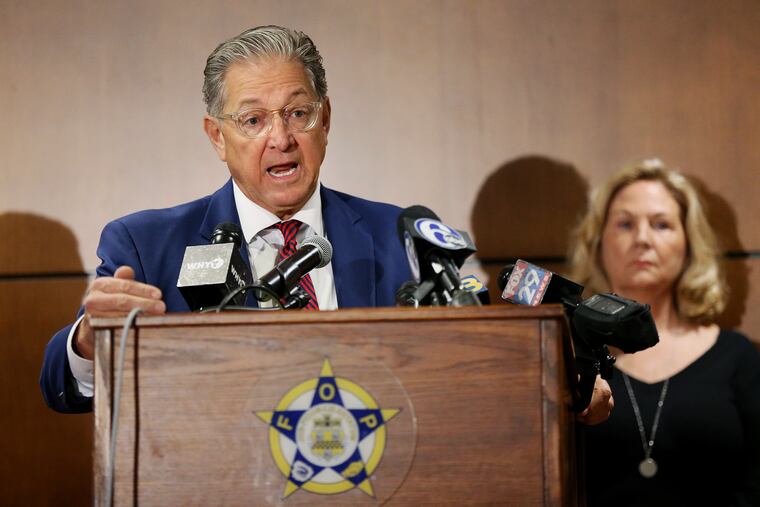In Mumia Abu-Jamal appeal, officer’s widow seeks to remove Philadelphia DA Larry Krasner’s Office from case
Attorneys for the widow of a slain police officer have asked the state Supreme Court to disqualify District Attorney Larry Krasner’s Office from further participation in convicted killer Mumia Abu-Jamal's appeals.

Attorneys for the widow of slain Philadelphia Police Officer Daniel Faulkner said Tuesday that they have asked the state Supreme Court to disqualify Philadelphia District Attorney Larry Krasner’s office from further participation in the appeal of convicted killer Mumia Abu-Jamal.
In their filing, lawyers for Maureen Faulker outlined what they described as conflicts of interest for Krasner’s office in the case. The petition, filed by attorney George Bochetto and two colleagues, asks the court to invoke its King’s Bench power and direct the state Attorney General’s Office to handle the appeal going forward.
Maureen Faulkner and Bochetto announced the petition at a news conference Tuesday at the Fraternal Order of Police headquarters in Northeast Philadelphia.
“I’m here for justice," Faulkner said. “Justice for Danny, and also justice for many victims that are being wronged by DA Larry Krasner.”
Krasner spokesperson Jane Roh said in an email that the office had no comment.
Abu-Jamal, 65, a former Black Panther, fatally shot Faulkner, 25, on Dec. 9, 1981, and was later convicted of first-degree murder and sentenced to death.
In 2011, then-District Attorney Seth Williams announced his office would no longer fight Abu-Jamal’s appeals of his death sentence and agreed to a life prison term. But Abu-Jamal has continued appealing his conviction.
In September, Abu-Jamal’s lawyer, Judith Ritter, asked Superior Court to remand his appeal to Philadelphia Common Pleas Court Judge Leon Tucker so the defense could present what it contends is newly discovered evidence from six boxes of files Krasner found last December in a storage closet of the District Attorney’s Office.
The prosecutor’s office, in a Sept. 17 filing, said it did not oppose Abu-Jamal’s motion to have the case sent back to Tucker. That prompted Maureen Faulkner to file a petition to intervene the next day.
Superior Court denied her request, but has yet to rule on whether it will send the case back to Tucker.
In Tuesday’s petition to the Supreme Court, Bochetto and attorneys David Heim and John O’Connell cited what they described as conflicts of interest in Krasner’s office: Paul George, assistant supervisor of the office’s Law Division, represented Abu-Jamal when he was a defense attorney; Jody Dodd, the head of the office’s Restorative Justice Unit, advocated for Abu-Jamal as a participant in a support group for him; and Krasner’s wife, former Common Pleas Court Judge Lisa Rau, worked as a lawyer at a firm that represented Abu-Jamal in the 1990s.
The District Attorney’s Office, in an October response, said neither George nor Dodd had any involvement in its handling of the case and noted that Rau had left the law firm in question.
Lawyers for Abu-Jamal, meanwhile, contend that the newly discovered documents show that witnesses who said they saw Abu-Jamal shoot Faulkner had been promised money or legal help in exchange for their testimony. Ritter also said documents in the boxes revealed for the first time handwritten notes indicating that the trial prosecutor was actively tracking the races of prospective jurors.
Ritter contended that taken together, the new evidence shows Abu-Jamal’s trial was “fundamentally unfair and tainted by serious constitutional violations.”
Faulkner’s lawyers, in their petition Tuesday, said Joseph McGill, the trial prosecutor in Abu-Jamal’s case, told them he had not been contacted by anyone from Krasner’s office about the newly discovered evidence. Had anyone asked, the petition said, he would have “given them detailed information which irrefutably demonstrated the absurdity of [Abu-Jamal’s] current position."
McGill, who stood with Faulkner and Bochetto at the news conference but did not speak, wrote in an affidavit attached to the petition that he never promised “anything of value” to a witness in exchange for testimony at trial. As for his jury-selection notes, he wrote that they were consistent with state law. He said he did not exercise any peremptory challenges against jurors based on race.